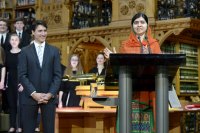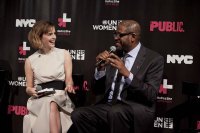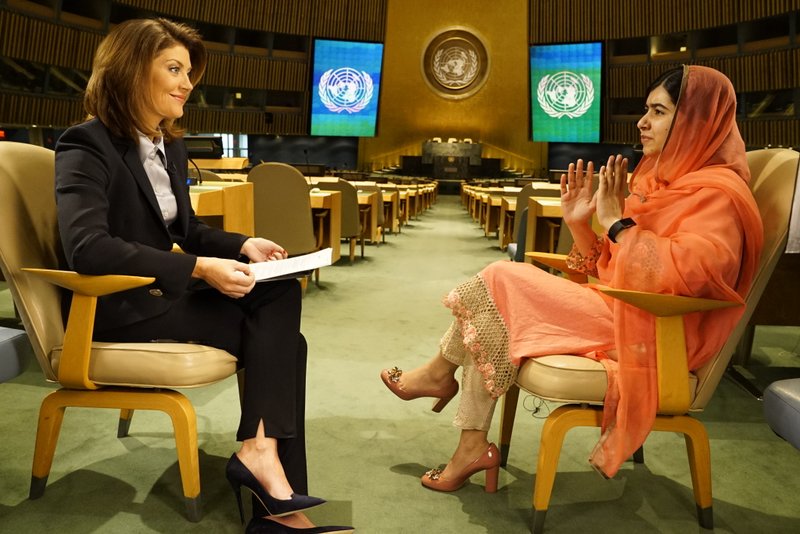The most important learning I do at this age in my life is learning from young people.
Civil rights activist, Angela Davis
What would happen if Baby Boomer Oprah Winfrey, Generation X frontman and record boss Jay-Z, UN Goodwill Ambassador and Millennial representative Emma Watson, and Burberry photographer and poster boy for Generation Z, Brooklyn Beckham, sat around a table to do business? If we’re to believe the results of one survey, “tension” is the answer.
Research commissioned by RICOH in 2015 found that 64% of older workers agree that there are fundamental differences in how employees from each generation work. And 63% expect workplace tensions to increase with the arrival of Generation Z into the workplace, upon which, for the first time in corporate history, four generations of employees will work side by side.[1]
Such expectations are undoubtedly fuelled by a raft of media commentary in which Millennials and Generation Z’s demands for speedy career progression and flexible working options are met with bemusement by those who’ve had to slog their way up the career ladder with only a handful of work-from-home days to their CVs. Or — at the other end of the scale — scathing attacks: “Lazy yet entitled […] snowflakes,” is how generational expert Meaghan Johnson sums up the labels that have been used to tarnish Millennials.[2]
But scepticism around the next generation’s integration into the workforce is nothing new. Back in 1990, TIME magazine published an article in which Generation X-ers were defined essentially as slackers. [3]
When we use negative words to describe the younger generation what we really are describing is a frustration to identify or understand the skill set that younger people are bringing into the workplace,
Johnson tells The Independent.[4]
Far more useful,argues political activist Angela Davis — in conversation during the Women of the World Festival, is to look to learn from those coming up behind you, seeking to understand what the business leaders of tomorrow can teach today’s executives.
MALALA YOUSAFZAI: USE YOUR VOICE
We realise the importance of our voices only when we are silenced. I raise up my voice — not so I can shout but so that those without a voice can be heard… we cannot succeed when half of us are held back,
Is her encouragement to anyone, old or young, who has suffered repression of any kind.[5]

As the youngest ever United Nations Messenger of Peace, and a recipient of the 2014 Nobel Peace Price, her opinions are canvassed by the media on everything from President Trump’s refugee ban to how the world’s leaders should address climate change. But before she had such a vast platform to speak universally, she was a schoolgirl armed with a deep conviction and a mobile. Aged just 11 she began dictating her story over the phone for an anonymous blog with BBC Urdu about the reality of life for a girl under Taliban occupation.
EMMA WATSON: RE-THINK GENDER DIVERSITY

At the age of 27, Watson’s new wave feminism has inspired the likes of Malala Yousafzai to proudly declare herself a feminist, as well as 1.3 billion conversations on the subject of gender equality. [6] And it’s her fresh approach to issues such as gender diversity in the boardroom and the gender pay gap which not only grabs headlines, but has the ability to inspire today’s HR and diversity and inclusion specialists to bold new types of action.
Like many people promoting the gender fluidity movement, Watson (who in May 2017 became the recipient of the MTV Movie Awards’ first ever gender-neutral acting prize) has reiterated how gender should not be considered in terms of binary, polarised opposites.
It is time that we all see gender as a spectrum instead of two sets of opposing ideals,
She argues, inviting today’s business leaders to ask the question: what might change in my business if we saw gender in more fluid terms — a broad scale of skills, talents and diverse needs across a spectrum of people — rather than seeing women and men as binary, polarised opposites?
ADORA SVITAK: NEVER STOP BELIEVING

Learning between grown-ups and kids should be reciprocal.
Adora Svitak, speaking aged 12 at the TED Conference
Childishness, she argues, should be redefined as the absence of limiting beliefs, of the kind of “That’s impossible” thinking that stops adults from fulfilling their destinies. “We kids aren’t hampered as much when it comes to thinking about reasons why not to do things. Kids can be full of inspiring aspirations and hopeful thinking, like my wish that no one went hungry. […] And that’s a good thing, because in order to make anything a reality, you have to dream about it first.”
As well as advocating for adults to create more opportunities for children, she encourages adults to lighten up, to see the possibilities in problems and to let go of negativity. After all, she says, every adult is a role model for a young person with a dream.
YOURSELF, WHEN YOUNG: WHO WERE YOU THEN, WHO ARE YOU NOW?
Socially competent children who could cooperate with their peers without prompting, be helpful to others, understand their feelings, and resolve problems on their own, were far more likely to earn a college degree and have a full-time job by age 25 than those with limited social skills.”
That was the conclusion of a 20-year study into the correlation between childhood experiences and career paths.[7]
Such results are perhaps not so surprising. After all, the modern workplace — with its demand for cross-disciplinary skillsets, group work and frequent people interactions — is not unlike a school environment we must master.
To understand how your own inner child may still be impacting your career for better or worse, look back and consider some of your earliest life lessons. How might experiences gained in your formative years be playing out in your relationships with colleagues, your willingness to take risks, be creative or spontaneous, your compliance (or lack of) with rules and regulations?
“Is your childhood still influencing your career? The answer is yes, inevitably, it is,” says everywoman Associate, Pippa Isbell. “It could be in a good way but then again, it could be sabotaging some of your relationships with colleagues and superiors – or their ‘child ego state’ [the thoughts, feelings and behaviours we still have which we developed as very small children] could be harming their relationships with you.” [8]
Back in 2011, a raft of high profile business leaders, including Arianna Huffington and Richard Branson took part in LinkedIn’s If I Were 22 project, penning letters to younger versions of themselves, offering the wisdom of their experiences. The exercise focussed on how those youngsters should change, what they should do more of and less of as they navigated the path ahead. Perhaps as worthy an exercise might be to ask what those 22-year-olds should retain, and what their older selves could learn from.
Photography:
Adora Svitak – UN Photographer and Joyce Svitak
[2] independent.co.uk/life-style/millennials-generation-z-linksters-what-next-generation-x-baby-boomers-internet-social-media-a7677001.html
[4] independent.co.uk/news/uk/this-britain/generation-x-the-slackers-who-changed-the-world-436651.html
[7] independent.co.uk/news/science/25-scientific-ways-your-childhood-influences-your-success-as-an-adult-a6865296.html





